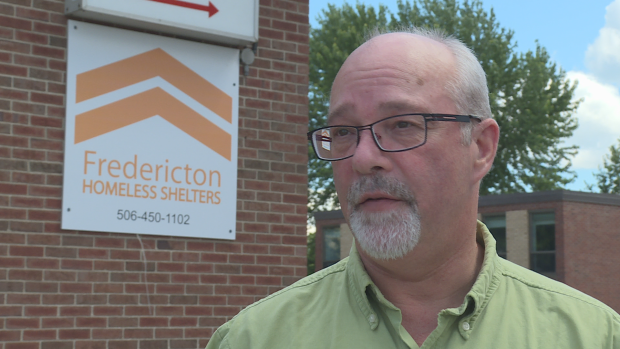Fredericton homeless shelters finding more people at the door
The executive director of Fredericton Homeless Shelters says the number of people using the service has risen by 50 since 2015, and there will be more if the province doesn't step up.
Warren Maddox leads the group that runs two homeless shelters, which give about 40 people a night protection from the cold.
But the shelters don't always have space, Maddox said.
When the temperature dips to below freezing and the windchill doesn't die down for a while, he said, sometimes the most he can do is give people warm blankets and coats and hope they "hunker down" that night.
I think that [governments] need to accept more responsibility - Warren Maddox, Fredericton Homeless Shelters Inc.
"The needs that are out there are overwhelming at times," Maddox told Information Morning Fredericton.
"There's a percentage of the population that we can't deal with. It's a complex issue."
All year round, occupancy rates are at 90 per cent, he said.
By the end of this year, he expects the shelters will have accommodated 300 individuals.
Critical cases
The most vulnerable among them are those dealing with significant mental health problems and addiction, Maddox said.
But the adult protection branch of the Social Development Department has been challenging branch to work with, he said.
"They should be stepping up and finding accommodation and working with those individuals, either through mental health and addictions, which is part of Department of Health, or through their own process," he said.
"I think that they need to accept more responsibility. They have a pretty rigid, tight, narrow definition of some of the stuff that they'll tackle."
He said that when dealing with some individuals with critical mental health needs, community treatment orders need to be used more.
Dorothy Shephard, the minister of social development who was just sworn in last Friday, said she's still figuring out the "nitty gritties" of her department, but said homelessness will take a high priority.
"Homelessness is pretty complex, and there's many reasons why someone is homeless," Shephard said. "It's not just always a matter of poverty."
She said there is more than one way adult protection can get involved. Someone might recommend an individual be assessed, or an individual might voluntarily ask to be assessed. Law enforcement might also put a person forward.
"There's no easy one approach is going to fit all," said Shephard.
She said she will be assessing how adult protection works.
"I'm always going to be wanting to understand how we do things. If there has been a failure in the system that we're aware of, I want to know for sure that we'll self-asses: What's gone wrong, how to fix it, where the gaps are, and how we're going to improve it."
'Sleeping rough on the street'

David Coon, MLA for Fredericton South, said the most common complaints people come to him with are about access to affordable housing and social support services.
"Just in the past week, I had a quadriplegic man living on social assistance served an eviction notice in his subsidized apartment, a couple evicted from their subsidized apartment because the company decided to give up the rent subsidies they were receiving from the Department of Social Development, and a man with multiple health problems living in his vehicle," Coon wrote in a letter to Information Morning Fredericton.
"There is also the tent city adjacent to the water treatment plant, and others sleeping rough on the street."
Coon said governments have failed to seriously deal with issues of poverty, housing, mental illness and addictions. Instead, he said, their attention has been focused "exclusively on the economy and government finance."
A minority government can now hopefully "bring about some change, but this requires collaboration which has yet to emerge."
Coon said when it comes to the rough living conditions of some people, especially during cold winter months, an "'emergency' emergency shelter" needs to be available.
"People need somewhere to go," he said.
A role for public
Shephard said the province will have to look to the public to provide those emergency services sometimes.
"We have looked to the community to institutions like the Salvation Army and the Red Cross," she said.
"I think we also need to hope that the community in many ways is going to respond to emergency situations … I think we need to rely on community-based organizations to at least let us know who needs the help."

